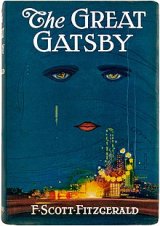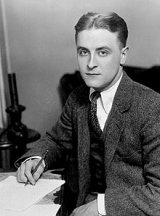The Great Gatsby Page #30
The Great Gatsby is a 1925 novel by American writer F. Scott Fitzgerald. Set in the Jazz Age on Long Island, near New York City, the novel depicts first-person narrator Nick Carraway's interactions with mysterious millionaire Jay Gatsby and Gatsby's obsession to reunite with his former lover, Daisy Buchanan. The novel was inspired by a youthful romance Fitzgerald had with socialite Ginevra King, and the riotous parties he attended on Long Island's North Shore in 1922
little coward!” A moment later she rushed out into the dusk, waving her hands and shouting—before he could move from his door the business was over. The “death car” as the newspapers called it, didn’t stop; it came out of the gathering darkness, wavered tragically for a moment, and then disappeared around the next bend. Mavro Michaelis wasn’t even sure of its colour—he told the first policeman that it was light green. The other car, the one going toward New York, came to rest a hundred yards beyond, and its driver hurried back to where Myrtle Wilson, her life violently extinguished, knelt in the road and mingled her thick dark blood with the dust. Michaelis and this man reached her first, but when they had torn open her shirtwaist, still damp with perspiration, they saw that her left breast was swinging loose like a flap, and there was no need to listen for the heart beneath. The mouth was wide open and ripped a little at the corners, as though she had choked a little in giving up the tremendous vitality she had stored so long. ------------------------------------------------------------------------ We saw the three or four automobiles and the crowd when we were still some distance away. “Wreck!” said Tom. “That’s good. Wilson’ll have a little business at last.” He slowed down, but still without any intention of stopping, until, as we came nearer, the hushed, intent faces of the people at the garage door made him automatically put on the brakes. “We’ll take a look,” he said doubtfully, “just a look.” I became aware now of a hollow, wailing sound which issued incessantly from the garage, a sound which as we got out of the coupé and walked toward the door resolved itself into the words “Oh, my God!” uttered over and over in a gasping moan. “There’s some bad trouble here,” said Tom excitedly. He reached up on tiptoes and peered over a circle of heads into the garage, which was lit only by a yellow light in a swinging metal basket overhead. Then he made a harsh sound in his throat, and with a violent thrusting movement of his powerful arms pushed his way through. The circle closed up again with a running murmur of expostulation; it was a minute before I could see anything at all. Then new arrivals deranged the line, and Jordan and I were pushed suddenly inside. Myrtle Wilson’s body, wrapped in a blanket, and then in another blanket, as though she suffered from a chill in the hot night, lay on a worktable by the wall, and Tom, with his back to us, was bending over it, motionless. Next to him stood a motorcycle policeman taking down names with much sweat and correction in a little book. At first I couldn’t find the source of the high, groaning words that echoed clamorously through the bare garage—then I saw Wilson standing on the raised threshold of his office, swaying back and forth and holding to the doorposts with both hands. Some man was talking to him in a low voice and attempting, from time to time, to lay a hand on his shoulder, but Wilson neither heard nor saw. His eyes would drop slowly from the swinging light to the laden table by the wall, and then jerk back to the light again, and he gave out incessantly his high, horrible call: “Oh, my Ga-od! Oh, my Ga-od! Oh, Ga-od! Oh, my Ga-od!” Presently Tom lifted his head with a jerk and, after staring around the garage with glazed eyes, addressed a mumbled incoherent remark to the policeman. “M-a-v—” the policeman was saying, “—o—” “No, r—” corrected the man, “M-a-v-r-o—” “Listen to me!” muttered Tom fiercely. “r—” said the policeman, “o—” “g—” “g—” He looked up as Tom’s broad hand fell sharply on his shoulder. “What you want, fella?” “What happened?—that’s what I want to know.” “Auto hit her. Ins’antly killed.” “Instantly killed,” repeated Tom, staring. “She ran out ina road. Son-of-a-bitch didn’t even stopus car.” “There was two cars,” said Michaelis, “one comin’, one goin’, see?” “Going where?” asked the policeman keenly. “One goin’ each way. Well, she”—his hand rose toward the blankets but stopped halfway and fell to his side—“she ran out there an’ the one comin’ from N’York knock right into her, goin’ thirty or forty miles an hour.” “What’s the name of this place here?” demanded the officer. “Hasn’t got any name.” A pale well-dressed negro stepped near. “It was a yellow car,” he said, “big yellow car. New.” “See the accident?” asked the policeman. “No, but the car passed me down the road, going faster’n forty. Going fifty, sixty.” “Come here and let’s have your name. Look out now. I want to get his name.” Some words of this conversation must have reached Wilson, swaying in the office door, for suddenly a new theme found voice among his grasping cries: “You don’t have to tell me what kind of car it was! I know what kind of car it was!” Watching Tom, I saw the wad of muscle back of his shoulder tighten under his coat. He walked quickly over to Wilson and, standing in front of him, seized him firmly by the upper arms. “You’ve got to pull yourself together,” he said with soothing gruffness. Wilson’s eyes fell upon Tom; he started up on his tiptoes and then would have collapsed to his knees had not Tom held him upright. “Listen,” said Tom, shaking him a little. “I just got here a minute ago, from New York. I was bringing you that coupé we’ve been talking about. That yellow car I was driving this afternoon wasn’t mine—do you hear? I haven’t seen it all afternoon.” Only the negro and I were near enough to hear what he said, but the policeman caught something in the tone and looked over with truculent eyes. “What’s all that?” he demanded. “I’m a friend of his.” Tom turned his head but kept his hands firm on Wilson’s body. “He says he knows the car that did it … It was a yellow car.” Some dim impulse moved the policeman to look suspiciously at Tom. “And what colour’s your car?” “It’s a blue car, a coupé.” “We’ve come straight from New York,” I said. Someone who had been driving a little behind us confirmed this, and the policeman turned away. “Now, if you’ll let me have that name again correct—” Picking up Wilson like a doll, Tom carried him into the office, set him down in a chair, and came back. “If somebody’ll come here and sit with him,” he snapped authoritatively. He watched while the two men standing closest glanced at each other and went unwillingly into the room. Then Tom shut the door on them and came down the single step, his eyes avoiding the table. As he passed close to me he whispered: “Let’s get out.” Self-consciously, with his authoritative arms breaking the way, we pushed through the still gathering crowd, passing a hurried doctor, case in hand, who had been sent for in wild hope half an hour ago. Tom drove slowly until we were beyond the bend—then his foot came down hard, and the coupé raced along through the night. In a little while I heard a low husky sob, and saw that the tears were overflowing down his face. “The God damned coward!” he whimpered. “He didn’t even stop his car.”
Translation
Translate and read this book in other languages:
Select another language:
- - Select -
- 简体中文 (Chinese - Simplified)
- 繁體中文 (Chinese - Traditional)
- Español (Spanish)
- Esperanto (Esperanto)
- 日本語 (Japanese)
- Português (Portuguese)
- Deutsch (German)
- العربية (Arabic)
- Français (French)
- Русский (Russian)
- ಕನ್ನಡ (Kannada)
- 한국어 (Korean)
- עברית (Hebrew)
- Gaeilge (Irish)
- Українська (Ukrainian)
- اردو (Urdu)
- Magyar (Hungarian)
- मानक हिन्दी (Hindi)
- Indonesia (Indonesian)
- Italiano (Italian)
- தமிழ் (Tamil)
- Türkçe (Turkish)
- తెలుగు (Telugu)
- ภาษาไทย (Thai)
- Tiếng Việt (Vietnamese)
- Čeština (Czech)
- Polski (Polish)
- Bahasa Indonesia (Indonesian)
- Românește (Romanian)
- Nederlands (Dutch)
- Ελληνικά (Greek)
- Latinum (Latin)
- Svenska (Swedish)
- Dansk (Danish)
- Suomi (Finnish)
- فارسی (Persian)
- ייִדיש (Yiddish)
- հայերեն (Armenian)
- Norsk (Norwegian)
- English (English)
Citation
Use the citation below to add this book to your bibliography:
Style:MLAChicagoAPA
"The Great Gatsby Books." Literature.com. STANDS4 LLC, 2025. Web. 27 Feb. 2025. <https://www.literature.com/book/the_great_gatsby_1598>.








Discuss this The Great Gatsby book with the community:
Report Comment
We're doing our best to make sure our content is useful, accurate and safe.
If by any chance you spot an inappropriate comment while navigating through our website please use this form to let us know, and we'll take care of it shortly.
Attachment
You need to be logged in to favorite.
Log In